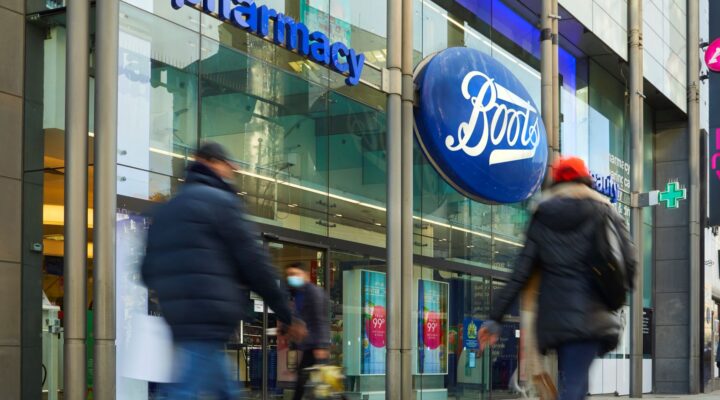Wellness has become a priority for people in the wake of the pandemic as evidenced by the surge in demand for health and well-being products, which is projected to reach $5.2 billion by 2030. Herbal supplements, vitamins and minerals and protein-based products have saturated/(flooded) the market and the businesses that sell them have experienced phenomenal growth, online during the pandemic and in the years following. Retailers within the pharmacy sector are evolving and exploring ways to best c
t cater to consumers with the creation of one-stop-shop pharmacy retail spaces and superstores.
Boots does Beauty and sells off assets as opposed to business
This can be seen globally with the investment in the retail space and formation of Boots Beauty in the UK, which abandoned offers to sell to private companies for what the company considered an undervaluation. A joint £5 billion bid from Reliance Industries and Apollo Global Management was rejected, with other interest from Asda, brothers Mohsin and Zuber Issa, CVC and Bain Capital. The business is reportedly valued at £7 billion and its parent company Walgreens was looking for up to £10 billion, to allegedly focus on its US-based businesses. The American pharmacy giant is now reportedly considering listing Boots on the London Stock Exchange after divesting the 53,000-member, Boots Pension Scheme to Legal & General (LSE:LGEN), a UK financial services group and a major global investor with over £1.2 trillion in managed assets.
Meanwhile, the first Boots Beauty store opened in Battersea, London, on December 6, offering masterclasses, a fragrance refill station, a digital fragrance finder tool, beauty product recycling services, and hair styling sessions in addition to premium, sustainable and affordable products. It also features in-store pharmacists trained to complete dermatologist consultations, including Dermalux LED light therapy.
Coming after the business has continued to renovate the look of its beauty halls over the last three years, the 11,000 square foot space is part of Boots’ strategy to build a bridge between medicine and retail, much like Chemist Warehouse has done with Ultra Beauty and superstores in Australia. Chemist Warehouse recently opened its first Irish superstore earlier this month. Priceline is another Australian pharmacy that has increased its foothold in the beauty and wellness space under the ownership of retail conglomerate Wesfarmers.
And then there were two
Acquisitions in Australia’s retail pharmacy sector have created two major players that will continue to dominate the space, with the reverse acquisition of Sigma by Chemist Warehouse leading shares in the business to boom to a six-year high. Wesfarmers acquired Priceline’s parent company API in 2022 when CEO Rob Scott saw an opportunity to enter the fast-growing $25 billion health, well-being and beauty sector. It formed a health division in 2022, consisting of 73 company-owned Priceline stores, 396 Priceline pharmacy franchise stores and 89 Clear Skincare clinics and is also a wholesale distributor of pharmaceutical goods. Further expansion continued in 2023 with the acquisitions of telehealth provider InstantScripts and the SILK Group, which operate 140 wholly-owned, joint venture and franchised clinics, and is expanding its digital and medical aesthetics offering.
Since speculation of the impending Chemist Warehouse and Sigma merger first began, shares have steadily climbed from $0.68 on November 30 this year to $0.74 on December 6, experiencing an inevitable spike to $1.04 on December 13 when a trading halt was lifted. Sigma shares have since steadied after reaching a six-year high, to close the day at $1.045 on December 14. On Monday, December 18, Sigma shares opened at $0.975.
Improving the quality of life and human health
Australians have continued to prioritise their health in the wake of the pandemic as it highlighted the importance of a robust immune system, aided through supplements, health and wellness products.
Holistic well-being and proactive self-care are areas in which brands and retailers are positioning to best cater to consumers to win their favour.
Glenn Cross, chairman of Ezz Life Science told Inside Retail, “The Australian supplement industry has experienced remarkable growth, fueled by an increasing awareness of the role that supplements can play in supporting overall health and addressing specific nutritional deficiencies. This growth is largely attributed to an ageing population, rising health concerns, and a shift towards preventive healthcare.”
The influence of social media and TikTok in particular has resulted in a noticeable uptake of supplements such as probiotics, which have attracted attention with viral videos showcasing the benefits of probiotics, prebiotics, and digestive enzymes for promoting gut balance and overall well-being.
“Consumers are now actively seeking products that contain specific strains of beneficial bacteria and ingredients known to promote digestive wellness, as highlighted by the latest trends circulating across various social media platforms. This growing interest in gut health, fostered by the digital landscape, has consequently led to increased market demand for a diverse range of supplements designed to address and optimise digestive functions,” Cross told Inside Retail.
In 2023, Ezz launched a range of health supplements that cater for a variety of areas across all age groups on the Chemist Warehouse Marketplace. In March, EZZ further expanded on its omnichannel distribution with an Amazon store offering a range of health and wellness products that has further been expanded with the addition of three new nutritional supplement product skews.
In FY23, the Ezz-branded products portfolio that includes its vitamin and dietary supplements drove underlying revenue growth of 299.8 per cent, contributing $32.5 million, whilst the beauty-focused EAORON-branded skincare products accounted for $4.6 million in revenue, representing 12.4 per cent of total revenue.
In 2024, Ezz plans to further build its product portfolio to include sports nutrition, weight management, herbal and paediatric products, in order to cater to the demand from Australian and international markets.

